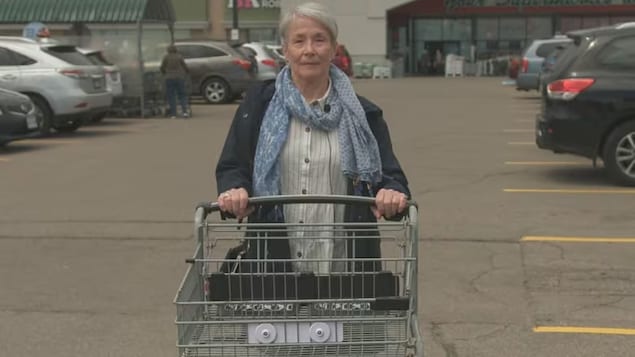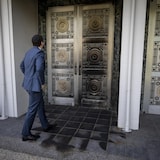- Home
- Economy
Customers are fed up with anti-theft measures at stores. Retailers say organized crime is to blame

Susan Dennison said she was humiliated when the wheels on her shopping cart locked at a Loblaw-owned Fortinos grocery in Burlington, Ont. She said an employee rushed over and demanded to see her receipt. Some retailers are beefing up anti-theft measures, such as locking the wheels on shopping carts, that have raised the ire of shoppers. (Andy Hincenbergs/CBC)
Photo: (Andy Hincenbergs/CBC)
Industry group says 'retail is the new frontier' for organized criminal gangs
Susan Dennison recently had an unsettling experience at her local grocery store, a Loblaw-owned Fortinos in Burlington, Ont.
Just as she was leaving, the wheels on her shopping cart locked up — making it immobile.
She said a store employee rushed over and demanded to see her receipt.
I felt like I was ambushed,
said Dennison, who scrambled to find her bill. She's badgering me, like, 'Is it in your wallet? Is it in your pocket?'
She said she was finally cleared when the employee found the receipt — in one of her shopping bags.
It seemed like [it took] forever, with people walking by. It was humiliating.
The carts are only meant to lock if a customer does something suspicious. But, in Dennison's case, it turned out there was a glitch.
Their methods need to catch the thieves, not honest customers,
she said.
Many shoppers have made similar complaints as several major retailers beef up their anti-theft tactics.
Along with wheel-locking shopping carts, other contentious measures include metal gates (new window) with designated entry and exit points, random (new window) receipt checks and tall plexiglass barriers (new window), which recently popped up at many Loblaw stores.
Major retailers like Canadian Tire and Walmart have implemented some of the measures; Loblaw has incorporated all of them.
The Retail Council of Canada (RCC) says retailers need to better communicate to shoppers why the measures are necessary.
The big problem is organized retail crime,
said the industry group's CEO, Diane Brisebois. We're talking here about gangs that are in the business of stealing, and retail is the new frontier.
But some industry experts argue a better solution would be to avoid anti-theft tactics that make regular shoppers feel like they're being targeted.
It's like turning shopping into airport security, where you're self-conscious about making a mistake that's going to get you in trouble,
said Christopher Andrews, a sociologist and author of The Overworked Consumer: Self-Checkouts, Supermarkets, and the Do-It-Yourself Economy.
Is organized crime really on the rise?
In response to customers' complaints about its security measures, Loblaw, Canada's largest grocer, has repeatedly said that organized crime is to blame.
This surge in organized retail crime remains a significant problem for the retail industry,
said Loblaw CFO Richard Dufresne during a conference call (new window) in late 2023.
These are sophisticated organizations that are increasingly using violent tactics and complex networks to steal and sell stolen goods for profit.
Loblaw has not provided data to support its claim.
According to Statistics Canada (new window), police-reported organized crime makes up only a small portion (new window) of retail theft, and it has declined between 2018 and 2022.
However, Brisebois said those statistics are incomplete, as many crimes go unreported. She also didn't provide hard data, but said that in speaking with members and with law enforcement, RCC has determined that organized retail crime is a burgeoning problem.
They basically choose a location. They involve a number of people, and they target merchandise that they know has high value on the street,
said Brisebois. We're talking about things that are easy to sell very quickly, such as health and beauty aids, baby [formula].
She said RCC is working on compiling retail theft statistics, which it hopes to make available soon.
WATCH: Customer anger over anti-theft tactics:
Humiliated at the grocery store: anti-theft tactics anger shoppers
Grocery retailers in Canada, like Loblaws and Walmart, are upping security to combat a rise in theft, but some of the tactics are sparking customer backlash.
Last year, the U.S. National Retail Federation initially reported a startling statistic: Organized retail crime accounted for nearly half of the estimated $94.5 billion US that retailers lost due to missing merchandise in 2021.
However, the industry group retracted the claim (new window) eight months later, after it was revealed (new window) that the report was based on erroneous data.
The initial flawed report led to a massively overinflated figure that was getting circulated in the press,
said Trevor Wagener, a researcher and chief economist for the Computer & Communications Industry Association in the U.S.
He said quantifying organized crime is challenging, because it can be hard to know when it's happening.
Generally, you won't have the evidence as a retailer looking through your security footage,
said Wagener. You may have a video feed showing two or three individuals who are gathering goods and walking out without paying for them. Now, was this subsistence shoplifting … or was this part of an organized crime effort?
'There is a solution out there'
Vancouver-based retail consultant David Ian Gray says that regardless of the cause of retail theft, retailers should avoid anti-theft measures that make regular shoppers feel like they're being surveilled.
There's a feeling that you're a thief in the making until you prove otherwise,
he said. There is a solution out there. There's got to be. The current status quo is just bad for shopper experience, and that's not what you want when you're in retail.
Legal experts also argue that retailers can't enforce receipt checks (new window) in many cases, and that they could lead to racial profiling.
More vulnerable groups might be targeted ... because there are unfortunately biases, both conscious and unconscious, when it comes to racialized individuals,
Vancouver-based criminal lawyer Kyla Lee told (new window) CBC News.
Gray suggests more employees on the floor may help combat theft without irritating customers, but adds that hiring extra workers may not work with a retailer's bottom line.
Some retailers are using artificial intelligence to combat theft.
In the U.S., Walmart is rolling out AI-powered technology to replace routine receipt checks at its more than 600 big box Sam's Club stores.
According to Walmart (new window), when shoppers pass through the exit area, the retailer uses a combination of computer vision and digital technology to verify if they've paid for all the items in their cart.
But Gray warns that sometimes technology fails.
[If it] is correct 90 per cent of the time, that's 10 people out of 100 that will be falsely shamed and accused,
he said.
According to Dennison, it was a glitch that caused her cart to lock, and for her to be falsely shamed.
If they're going to implement anti-theft technology, they'd better make sure it works,
she said.
In the meantime, Dennison has found her own solution: She has switched grocery stores.
Sophia Harris (new window) · CBC News




